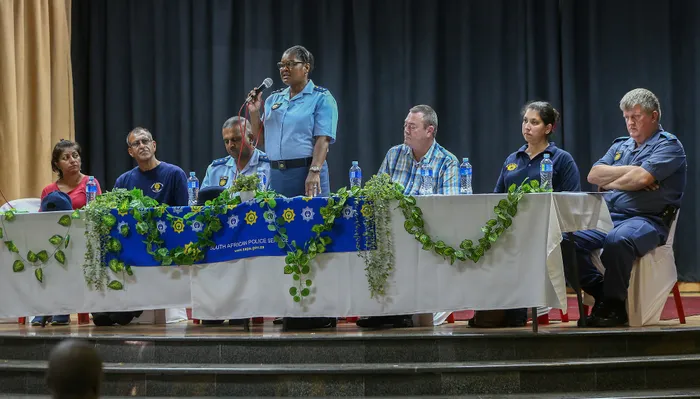Clairwood’s crime crisis: residents call for police action

The SAPS Brighton Beach hosted a crime imbizo in Clairwood, south of Durban, on Saturday. Seated from left are Ashika Kissoonduth (deputy secretary CPF, Ravin Brijlal (vice chairperson CPF, Captain Pravin Naidu, Colonel Qaphe Ngubane, Detective Captain Brad Varley, Chantal Bransgrove-Bower and Lieutenant Colonel Sarel Kruger. Picture: Leon Lestrade / Independent Newspapers
The Clairwood community and businesses, which is south of Durban, blamed the violence in the are on the amaphara (criminals) who had taken over the suburb’s streets and the police station’s distance.
The SAPS Brighton Beach hosted a crime imbizo in Clairwood on Saturday. Despite the poor turnout certain community members put their point across to the police management in attendance.
Clairwood, a former residential area, is now overtaken by truck depots and an increasing number of informal settlements.
Brighton Beach SAPS spokesperson Captain Louise le Roux said the objective of the community engagement included:
- Recourse to achieve short-term and long-term sustainable outcomes to address criminality within the policing precinct, and
- SAPS relationship building to secure community co-operation in the fight against crime.
She said the platform created through the imbizo allowed those in attendance to voice their concerns related to crime within Clairwood and share criminal activities anonymously.
According to the police, the crime reported from Clairwood was low.
Pravin Nansook, a resident, said the community lost faith in the police and therefore did not report crime.
The reasons, he said, was that response time was delayed and often they were advised to open cases if the items stolen from them were not insured.
Nansook said the police need to change this culture embedded in the community.
“There are various types of crime from burglary, theft from motor vehicles, and copper pipes and items on our premises. Police want us to identify the criminals when they already fled the scene or ask people to point out a criminal in full view of the public. The people living in the informal settlements are not criminals. Criminals are coming from outside and using the informal settlements as an escape route to avoid arrest,” Nansook said.
Sibusiso Mbutho, another resident, said the police station is more than 5km away and most of the residents do not have transport to report cases; thus the crime stats the police presented were not a true reflection of the crime they faced daily.
Mbutho also spoke to crime hotspots where robberies were taking place regularly. He said shebeens were operating without licenses and inconvenienced the community all night with music.
He also requested to have an active crime WhatsApp group so that the community could share images of illegal and criminal activities with the police.
“Most of the people are not sure where these amaphara came from. They were chased from other areas including Port Shepstone. Can the police, the CPF, and the community work together to get rid of them?
“If you get robbed, you cannot follow them into the shacks built along the M4. Despite the police patrols, we do not see any results with diesel theft, drug dealing, and shebeens.
“We see the police talking to the drug dealers, but they are not arresting them. We have not seen a campaign here to get rid of drugs.”
Police said scrap yards were inspected on a regular basis and those not compliant were issued with fines.
Brighton Beach Station Commander Colonel Qaphe Ngubane said there are plans to start with foot patrols in the area.
She said with the amaphara issue was a problem everywhere.
She tasked her police management team to set up a police operation together with roleplayers from the municipality to deal with the issue. Ngubane said that police needed information on the bosses of the drug trade in the area because they were only arresting their workers.
Ngubane said the community should supply the police with information. With regard to shebeens, she said they have a store room of confiscated liquor because of the regular raids, with most of the illegal dealers paying admission of guilt fines when they appear in court.
“If we chase these criminals from where they are staying, we need other roleplayers on board to find them alternative accommodation according to human rights laws. These are the challenges were are facing as the police.
“If our own police are breaking the law, we need evidence to prosecute them. We need the registration number of the vehicle and evidence that the police members did something wrong. We can also place that police member under covert surveillance,” she advised.
The Community Policing Forum chairperson Ravin Brijlal urged the community to work with the police and to report all crime in the area for adequate police resources to be deployed to the area.
Clairwood is patrolled by two police stations, Brighton Beach and Montclair SAPS.
zainul.dawood@inl.co.za